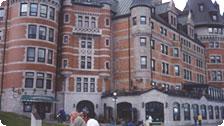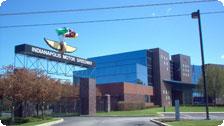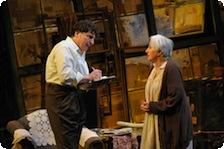by Sarah Naimark
Throughout 2006, Salzburg plays host to a festival celebrating the birth of its most famous citizen,— with the exception the Von Trapp clan, of course—Wolfgang Amadeus Mozart. This marathon fete includes lengthy concerts, walking tours and masses designed pay homage to the genius composer who was born and trained in the small Austrian town. Don’t tell them the feeling’s not mutual.
Mozart is said to have sneered that Salzburg is “no place for my talent”—but is it the right place for his 250th birthday party? A unique mix of kitsch and devotion, Salzburg has become the city-sized altar to a dead man who poo-pooed it in life.
Today, people dressed in period costumes offering Mozart-esque services rival those dressed in tourist gear, and the constant pandering game between the two oddly dressed groups is tangible in the streets. The lane where Wolfgang was born feels about as authentic as Disneyland. A McDonald’s near Mozart’s Geburthaus proudly displays a gilded and wrought-iron set of arches, enough to make your skin crawl with the corporate globalization heebie-jeebies.
Resting firmly on laurels earned in the 18th century, with a few diversions to a pre-war “Sound of Music” era, Salzburg feels less like a reverent hometown and more like a group of merchants coming together to exploit the town’s famous son. Inundated with commemorative birthday breeds of Mozart chocolates, powdered wigs, shot glasses and framed photo copies of music scores, a visitor will be begin to side with the composer himself, and feel the yearning for more cosmopolitan and worldly spots.
But don’t buy your ticket back to Vienna just yet.
Even for those who don’t find a separate joy in the sheer tackiness of some of the tributes —don’t get me started on the “Next To Mozart” wax museum— Salzburg’s inspirational charm is there for those who care to look beyond the commercial lust. The key to really seeing Salzburg is to give yourself just a bit of distance from it.
The best way to do this is to rent a bicycle from the rows of gently-used steeds lined-up near the bridges. Anti-two wheelers can always walk, but the feeling of the soft river water drifting past your face at around 5mph will play its own concerto in your ears. A half-mile down the green, milky Salzach River, past the beautifully crafted baroque homes that line the water, the trees outnumber the flashing cameras and wildflowers form their colorful musical notes written on the banks.
The return trip gives you a slowly unfolding view of the Cathedral and the remarkable Hohensalzburg Fortress, standing ever-ready for the siege that never came. Unassaulted by signs reading “Mozart was baptized here” and “Featured in the ‘Sound of Music’”, it’s simple to appreciate the understated glory of these buildings, and to realize how they might have played unconscious muses to Wolfgang’s delicate yet strong compositions.
After venturing out, next you must venture up. First grab an enormous pretzel from one of the street stands; be prepared for an unanticipated range in pretzel options, from poppyseed and onion to chocolate and cinnamon. I suggest the tried-and-true plain with salt. With pretzel in hand, take the quite vertical climb up to the fortress gates. The view from the fortress walls are worth the huff and puff.
Find a spot on the broad stone walls and perch with your authentically Austrian snack, and Salzburg is open to you. The rising baroque churches sharp against round Alpine mountains; the open squares with bubbling Roman fountains; the quickly trotting horse-drawn carriages; the constant melodic interaction of the people below through the network of streets— this is what Mozart saw. These are the elements that played into his mental symphony.
Finally you have a clear vision of the child Wolfgang dashing through the alleys, late for violin practice with his demanding father. You see him as a young man, returning weary from exhaustive concert tours and trips to Italy, comforted by the thought of sleeping in the house where he was born. You see him no longer as a face on a ball of chocolate, or a frozen wax figure, but as a person with an impact so extraordinary, his birth is met with joy over 200 years after his death.
This place etched its subtle but indelible mark in Mozart’s significant psyche. Though he may have felt that his talent outgrew Salzburg—he moved to Vienna in the early 1780s— he can’t have denied that it blossomed and flourished there.
Salzburg wishes you a happy birthday, Mr. Mozart. I can’t think of a better place to celebrate.
For information on Mozart’s 250th Anniversary celebration, visit: Mozart online







